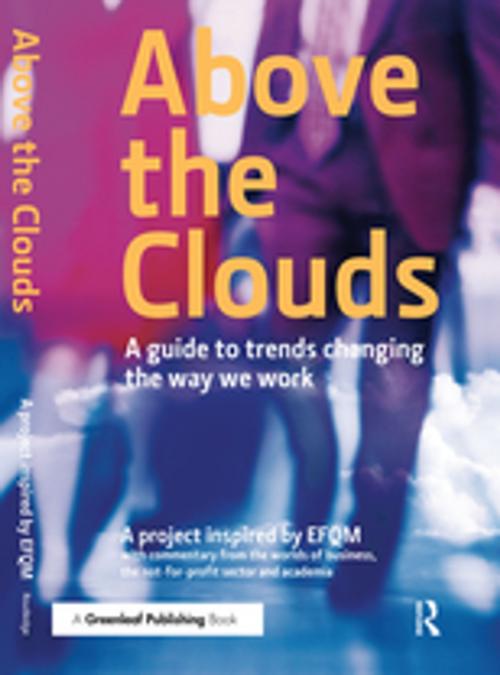Above the Clouds
A Guide to Trends Changing the Way we Work
Business & Finance, Career Planning & Job Hunting, Labor, Business Reference, Business Ethics| Author: | Efqm | ISBN: | 9781351280549 |
| Publisher: | Taylor and Francis | Publication: | September 8, 2017 |
| Imprint: | Routledge | Language: | English |
| Author: | Efqm |
| ISBN: | 9781351280549 |
| Publisher: | Taylor and Francis |
| Publication: | September 8, 2017 |
| Imprint: | Routledge |
| Language: | English |
Some of us work to live. Some of us live to work. Some of us, by design or default, don't work at all. Whatever your position, as a stakeholder in today's society, there is no avoiding the complex web that is the world of work. Everyone is affected to some degree by issues such as stress and work-life balance, teleworking, offshoring, stakeholder democracy, globalisation – the list goes on. But, as things continue to change at an ever-faster rate, what can we expect work to look like in the next five, ten, or twenty years? Above the Clouds is the result of a future studies project carried out by the European Foundation for Quality Management (EFQM), a not-for profit foundation that promotes excellence in European business. The project aimed to identify trends that will have an impact on the world of work over the coming decade. Work here is defined in terms of methods, organisation and future challenges. It took two years to create the full picture, which is now available in this book.
"Trendspotting" sessions were organised across Europe as a means of gathering ideas on where work was heading in the future. The experience and insights of people from a diverse range of backgrounds were included in the project. Working with raw material from these sessions, researchers investigated each of the trends and their possible ramifications on the world of work. The resulting articles were posted for comment online. People from all around Europe responded and some of these views are quoted in this book. In addition, academics and leading CEOs and executives were asked for their reactions to these trends. Each of the 15 chapters of Above the Clouds analyses a trend in detail and includes perspectives from business, academia and comments from the European public.
There are disagreements, but also a surprising amount of convergence on issues such as leadership, outsourcing, global risk, women, age, spirituality, stress and technology. Rather than trying to offer certainty, the book aims to equip people and organisations with the awareness and adaptability they will need to meet tomorrow's challenges to the way we work. It is fascinating reading for anyone interested in how the big issues of work are likely to impact on us all.
Some of us work to live. Some of us live to work. Some of us, by design or default, don't work at all. Whatever your position, as a stakeholder in today's society, there is no avoiding the complex web that is the world of work. Everyone is affected to some degree by issues such as stress and work-life balance, teleworking, offshoring, stakeholder democracy, globalisation – the list goes on. But, as things continue to change at an ever-faster rate, what can we expect work to look like in the next five, ten, or twenty years? Above the Clouds is the result of a future studies project carried out by the European Foundation for Quality Management (EFQM), a not-for profit foundation that promotes excellence in European business. The project aimed to identify trends that will have an impact on the world of work over the coming decade. Work here is defined in terms of methods, organisation and future challenges. It took two years to create the full picture, which is now available in this book.
"Trendspotting" sessions were organised across Europe as a means of gathering ideas on where work was heading in the future. The experience and insights of people from a diverse range of backgrounds were included in the project. Working with raw material from these sessions, researchers investigated each of the trends and their possible ramifications on the world of work. The resulting articles were posted for comment online. People from all around Europe responded and some of these views are quoted in this book. In addition, academics and leading CEOs and executives were asked for their reactions to these trends. Each of the 15 chapters of Above the Clouds analyses a trend in detail and includes perspectives from business, academia and comments from the European public.
There are disagreements, but also a surprising amount of convergence on issues such as leadership, outsourcing, global risk, women, age, spirituality, stress and technology. Rather than trying to offer certainty, the book aims to equip people and organisations with the awareness and adaptability they will need to meet tomorrow's challenges to the way we work. It is fascinating reading for anyone interested in how the big issues of work are likely to impact on us all.















